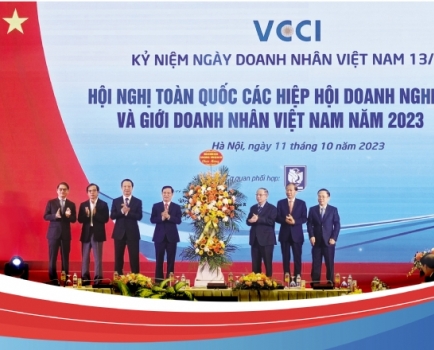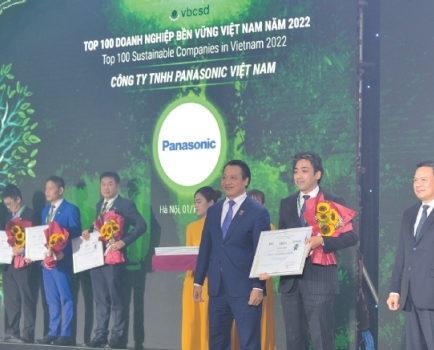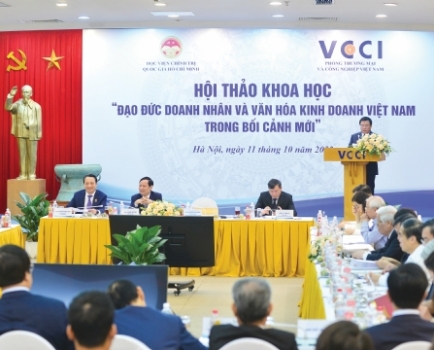Business Culture Competitive Advantage for Family Businesses
Mon, 13 Nov 2023 19:13:00 | Print | Email Share:
Family businesses play a pivotal role in shaping business ethics and culture, wielding these attributes as a form of "soft power" to foster sustainable competitiveness and growth. This perspective was prominently discussed during the workshop on cultivating a family business culture, organized by the VCCI Entrepreneurial Culture Center under the auspices of the Vietnam Chamber of Commerce and Industry (VCCI).
 VCCI President Pham Tan Cong delivers a keynote address at the workshop, emphasizing the cultivation of a family business culture |
Dispelling the misconception of business continuity as inherited property
Within the Vietnamese economy, family businesses are a substantial presence, accounting for 70% of the total number of enterprises, not to mention the over 5 million individual business households, often classified as micro-family businesses.
Highlighting the economic significance of family businesses, Mr. Pham Dinh Doan, Chairman of the Vietnam Family Business Council, referenced Family Capital's research on the global ranking of the top 750 family businesses. These enterprises collectively generate annual revenues exceeding US$9,000 billion and provide employment to nearly 30 million individuals.
Throughout economic history, it becomes apparent that powerful corporations often trace their roots back to family-run enterprises. In 2017, family businesses were estimated to contribute between 70% to 90% of global GDP.
In the United States, family businesses constitute nearly 90% of all registered companies. Australia acknowledges the contributions of family businesses through the observance of National Family Business Day on September 18, underscoring their impact on the national economy and local communities.
Within the Vietnamese context, Doan noted the absence of defined legal regulations pertaining to the family business model. Consequently, the concept of family business culture remains relatively novel, despite its historical significance within the Vietnamese economy.
In developed nations, family businesses frequently contribute between 55% to 80% of GDP, indicating untapped potential for the growth of family businesses in Vietnam, both in breadth and depth.
To ensure the sustainability of family businesses, Ms. Ha Thi Thu Thanh, Chairwoman of the Board of Members of Deloitte Vietnam Co., Ltd., argued that these enterprises must rest on four foundational pillars: Business strategy, competitiveness, corporate culture, and leadership commitment, all contributing to economic benefits.
Nonetheless, Vietnamese family businesses predominantly prioritize growth and economic performance, whereas the true strategy of family businesses should center on enhancing competitiveness and fostering a culture rooted in the commitments of their owners. This misalignment impedes the maturation of family business administration, obscures brand value, and hinders the recognition of leadership reputation.
Conversely, research indicates that successful generational transitions within family businesses are a rarity, with failures being all too common. One fundamental issue is the absence of clarity between family culture and corporate culture. Family businesses frequently conflate value continuation with property inheritance, ultimately constraining their developmental prospects.

VCCI President Pham Tan Cong and Vice President Hoang Quang Phong present gifts to participants and outstanding family businesses
Distinguishing between family culture and corporate culture
VCCI President Pham Tan Cong asserted that cultivating business ethics and culture is a mandatory prerequisite for sustainable business development. Family businesses inherently excel in reliability and prioritize maintaining trust and credibility with customers and partners, all while demonstrating a strong commitment to lasting through multiple generations. As such, instilling business ethics and culture within family businesses is an imperative undertaking.
Building a business civilization and culture is a time-intensive process, often spanning generations. Therefore, there is a pressing need to research and elucidate the nuances of business ethics and culture. This involves unifying the fundamental values of Vietnamese business culture, and understanding the methodologies for constructing and disseminating business culture within individual enterprises and across the broader Vietnamese business community.
Mr. Pham Dinh Doan further emphasized that family culture and corporate culture are not mere luxuries but integral elements intertwined with business operations. Behind every successful entrepreneur lies a cultivated family. Prioritizing culture, viewing it as the core, ensures business longevity and sustainable growth. Consequently, a cultured family becomes the spiritual asset and distinctive hallmark of a business.
To effectively cultivate family business culture, a clear understanding of the concepts and inherent nature of cultured family businesses and family business culture is essential. This includes addressing issues related to the strategy for establishing a sustainable business family, positioning family business culture, and addressing succession matters within these family-run enterprises.
In a more comprehensive analysis, Ms. Ha Thi Thu Thanh underscored that culture is an intrinsic, internal factor of businesses, not merely an external manifestation. In the context of sustainable development, culture plays a pivotal role in enhancing the competitiveness of businesses, including family enterprises.
In measuring sustainable development, culture emerges as a key driver of competitiveness for businesses. Leadership, especially within family businesses led by their owners, assumes a crucial role. Corporate culture reflects the vision of these leaders, serving as the foundation for sustainable business growth.
The influence of family culture on family business administration is profound. Transparency, both in financial matters and the allocation of authority, is of paramount importance. Family finances should be distinguished from corporate finances, with the family business owner receiving a fixed salary to avert feelings of jealousy or suspicion.
Furthermore, transparency in decision-making and leadership succession is critical. Traditionally, hierarchical family structures favored the eldest son, but in the realm of corporate culture, such practices prove outdated. “Family businesses now emphasize performance-based hierarchies, ensuring the most qualified individuals assume leadership roles,” said Ms. Ha Thi Thu Thanh.
By: Vietnam Business Forum
Source: https://vccinews.com/news/51091/business-culture-competitive-advantage-for-family-businesses.html
---------------------------------------------
Same category News :













